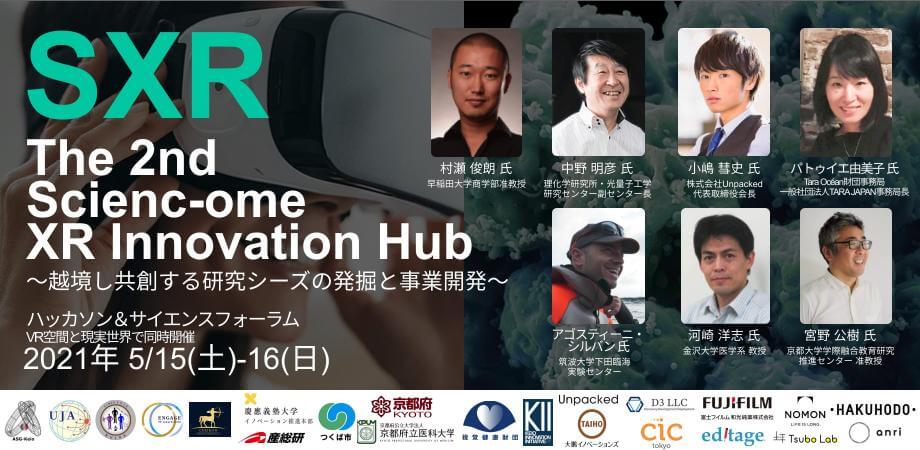
「The 2nd Scienc-ome XR Innovation Hub〜越境し共創する研究シーズの発掘と事業開発〜」が現実と仮想現実空間をつなぐクロスリアリティ(XR)型のフォーラムイベントとして、2021年5月15日・16日に日米を繋いで行われました。ハッカソン参加者は95名(6-8名x12チーム)で、日本各地、米国からXRの世界にアクセスし、活発な議論が行われ、ZoomおよびYoutubeを通して世界へ発信されました。主催者であるASG-Keio(*1)は、様々な専門性を持つ多くの若手研究者が、所属する機関の枠を超えてアイデアを交換するコミュニティ形成を目的とし、共同主催者であるUJA(*2)は世界各地の日本人研究者を国と分野の壁を超えて繋ぐことを目指し、若手研究者自身が中心となり、活動を進めてきました。コロナ禍において地理的・物理的・心理的制約を抱える現在、様々な垣根を超える活動を継続してきたメンバーは、XR技術を活用したシンポジウムを開催し、ハッカソンイベントを通じて、未来に向けたセレンディピティを生み出し、そして新しい創造を生み出しました。

今回のハッカソンには、世界で活躍する日本人研究者だけではなく、Z世代の高校生も多く参加し、12のトピックに対し、各チームがXR空間で研究立案を行い、目的、方法、期待される結果などアブストラクトを作成しました。その後、5分間のプレゼンによる発表を行い、垣根をこえた唯一無二のシーズを世に出そうと奮闘しました。この二日間、ZoomやYouTubeでの配信も含めると合計のべ800人以上が参加・視聴プログラムとなりました。
ハッカソンとフォーラムはVR空間と現実世界を組み合わせて行われ、東京会場のCIC Tokyoとつくば会場のつくばスタートアップパークには研究者や高校生が集い、ハッカソンに取り組みフォーラムを視聴するとともに、ハッカソンの実況中継を行いました。

フォーラムでは、早稲田大学 村瀬 俊朗氏の「新しい価値を創造できるチーム作り」に始まり、生細胞内イメージングや脳科学の研究内容やアートと教育の融合といった内容の新たな分野の創出に関わる講演が多数行われました。

ハッカソンが行われたVR空間では、参加者はアバターを操作しつつ、時には空を飛びながら、年代と空間を超越して新たな研究プロジェクト創出に取り組みました。それぞれのチームは、フェムテック、デジタルヘルスケア、教育のDX、サイボーグ、パンデミックに強い社会、未来の食といったテーマに取り組み、中には不老不死のデザインや、遺伝子指導によるがん細胞の有用化といったアイデアも創出されました。

今回の参加者は非常に多様性に飛んでおり10代から40代がバランスよく参加しています。また、約7割の参加者が海外での留学経験や勤務経験があるといったバックグラウンドでした。

なお、全体として参加者の満足度は極めて高く、例えば「参加したハッカソン活動の内容や成果を、参加していない人に伝えたいと思いますか。」というアンケートには約95%の参加者はが前向きな回答をしました。

なお、今回は以下の企業・組織にスポンサーシップをはじめとした協力を頂き開催されました。次回の開催にあたってもスポンサーの募集は行いますので、ご関心のある方はJapan X(R) the Venue事務局 < info@japanxr-science-forum.org >にコンタクトください。
【プログラム】
5月15日(土)
9:00-9:35 開会・ハッカソンの説明
9:35-10:00 講演:早稲田大学 村瀬 俊朗氏「新しい価値を創造できるチーム作り」
10:00-12:40 ハッカソン Day1
13:00-13:25 午後の部開会
13:25-14:00 講演①:究極の生細胞内イメージング
中野明彦氏(理化学研究所・光量子工学研究センター副センター長)
14:00-14:20 講演②:中高生市場の可能性と今後の「教育・育成」の在り方
―総合型選抜入試の拡大と求められる能力―
小嶋彗史氏(株式会社Unpacked代表取締役会長)
14:30-15:05 講演③:科学とアートと教育の融合で、海洋環境の現状を伝える
パトゥイエ由美子氏(Tara Océan(タラ オセアン)財団 事務局)
アゴスティーニ・シルバン氏(筑波大学下田臨海実験センター)
15:05-15:25 講演④:だから脳はやめられない
河崎洋志氏(金沢大学医学系 教授)
15:25-16:00 講演⑤:問いを問う
宮野公樹氏(京都大学学際融合教育研究推進センター 准教授)
5月16日(日)
8:00-10:30 ハッカソン Day2
10:30-12:00 ハッカソン発表会
12:00-13:00 表彰式
クロージング
足立剛也氏(医師/皮膚科専門医/アレルギー専門医)
佐田亜衣子氏(熊本大学 国際先端医学研究機構)
主催:一般社団法人慶應反分野的サイエンス会(ASG-Keio)
一般社団法人/米国501(c)(3)NPO法人海外日本人研究者ネットワーク(UJA)
共催:(ボストン) ロングウッドで朝食を〜Breakfast at Longwood〜
(シカゴ) ノースウェスタン大学日本人研究者の会(NUJRA)
(ロサンゼルス) Southern California Japanese Scholars Forum (SCJSF)
(東京) 慶應義塾大学イノベーション推進本部、慶應義塾大学病院臨床研究推進センター、CIC Tokyo
(京都) 京都府、京都府立医科大学
後援:在アメリカ合衆国日本国大使館、東京都、つくば市、科学技術振興機構 (JST)、
研究大学コンソーシアム(RUC) 異分野融合タスクフォース、国立研究開発法人産業技術総合研究所、
京都大学学術研究支援室 (KURA)、公益財団法人関西文化学術研究都市推進機構イノベーションデザイン・プラットフォーム(IdP)
協力:厚生労働省政策研究班免疫アレルギー疾患研究10か年戦略次世代タスクフォース(ENGAGE-TF) 、XPLANE、
奈良先端科学技術大学院大学、関西大学
XR Partner:Microsoft Project Users Forum (MPUF)、株式会社メディプロデュース
SDGs Partner:NPO法人ケイロン・イニシアチブ
CIC Tokyoについて
CIC Tokyoは、2020年10月1日に虎ノ門ヒルズビジネスタワーの15階と16階(合計約6,000平米)にオープンした、国内最大級のイノベーションセンターであり、スタートアップ中心に250社以上の企業や団体が入居できる広大なワークスペースと、ビジネスの成長とグローバル展開を加速するためのコミュニティやサービスを提供します。CIC Tokyoに入居するスタートアップ企業はイノベーションコミュニティに参画することができ、エコシステム内のキープレイヤーと関係構築をすることができます。
https://jp.cic.com/
*1 一般社団法人慶應反分野的サイエンス会
一般社団法人慶應反分野的サイエンス会:Anti-disciplinary Science Group in Keio(ASG-Keio)は、サイエンス会様々な専門性を持つ多くの若手研究者が、所属する機関の枠を超えてアイデアを交換するコミュニティ形成を目的とし活動しています。2001年ノーベル化学賞を受賞した野依良治先生によれば、「現代の文明環境は(中略)もはや分野連携というよりは、学境の撤廃、反分野的 (anti-disciplinary) な破壊活動を起こし、あるべき科学の進展を目指すべきであろう。」とあります。医師、研究者としての多忙な日々の中でも診療科、領域を超えた連携のマインドセットを持ち続けることの重要性を鑑み、2017年に6名のメンバーが集まり、Interdisciplinary Science Group in Keio (ISG-Keio) という名称で、慶應義塾大学信濃町キャンパスにおける若手研究者を対象とした有志の勉強会として活動を開始しました。
URL: https://sites.google.com/keio.jp/asg/
(Scienc-ome: https://www.scienc-ome.com/ )
代表理事: 早野元詞
*2 一般社団法人/米国NPO法人海外日本人研究者ネットワーク
一般社団法人/米国NPO法人海外日本人研究者ネットワーク:United Japanese Reserchers Around the World (UJA)は、海外で活躍する日本人研究者6000人のネットワークのもと、「信頼の見える化によって研究者のWellbeingを育み、すべての日本人研究者が安心して、国際的に活躍するサイエンスの未来を創る」のVisionに向かい、以下3つのミッションを遂行しています。
1:留学を考える人へ情報・支援を提供する窓口の整備
2:日本・国際舞台において活躍し続けるための相互支援とキャリアパスの透明化
3:教育・科学技術行政機関との情報交換および連携
理事・会長: 足立 剛也
hbspt.forms.create({
portalId: “53802”,
formId: “8c4c1989-9dda-4f3a-b135-9169ba6af05d”
});